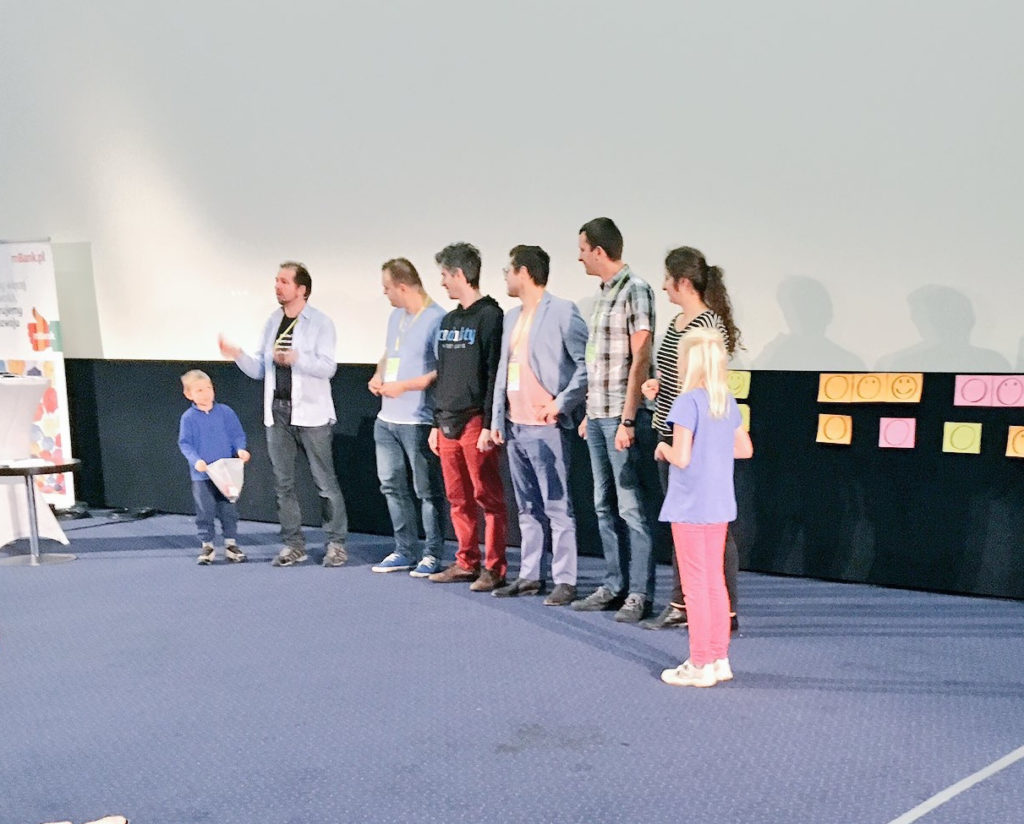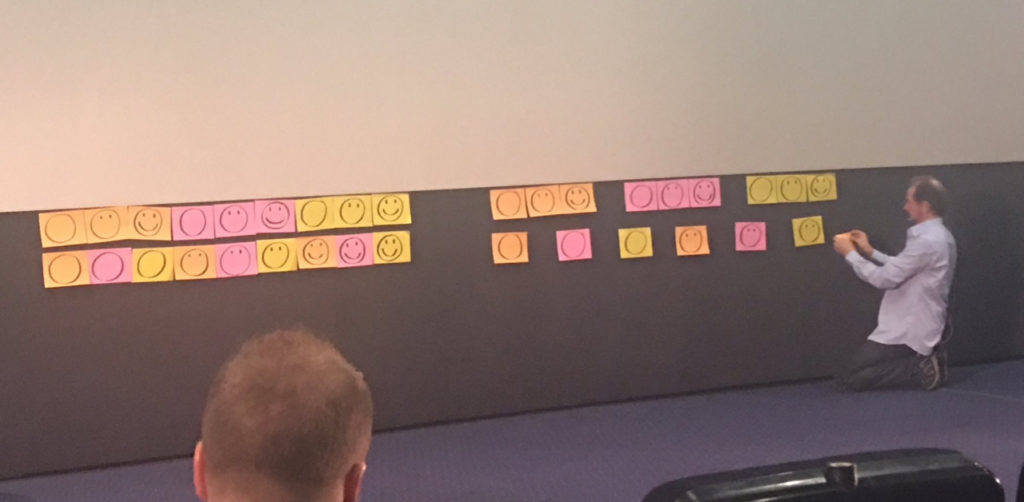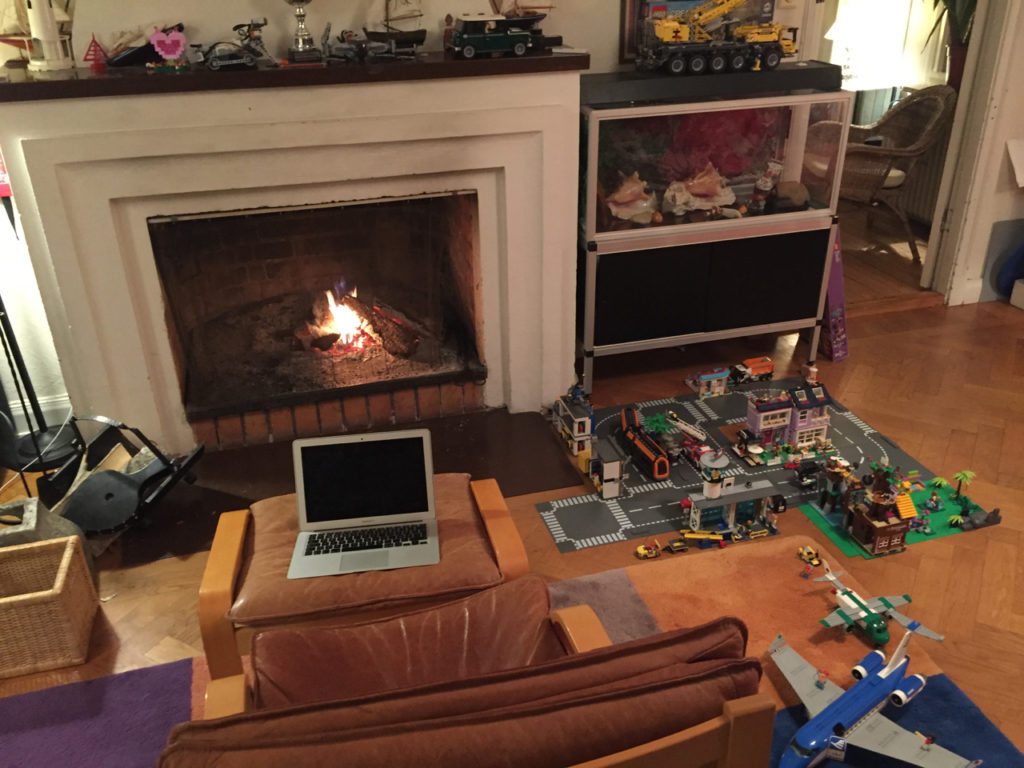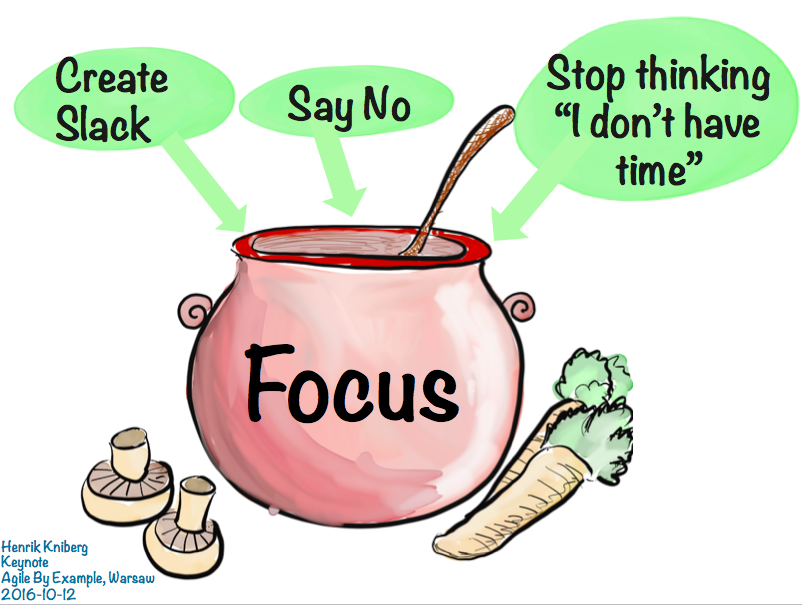Here is my slide (yes, it’s just one slide) from my keynote at AgileByExample in Warsaw. And a video of the talk. Scroll down for a written summary.
And a couple of photos:


Key points from the keynote:
- I often the get the question “How do you find the time”.
- “How do you find the time” is the wrong question. You have LOTS of time! Time is the most abundant, free, and fairly distributed resource in the world. You get 24 fresh new hours every day, and you don’t even have to get out of bed for it. That is, until one day you wake up dead, in which case time doesn’t matter (since you won’t miss it).
- Since you have so much time, the right question is: What will you do with all this Time?
- Burnout sucks. Surprisingly many people have been burned out (or near-burned out), including me. And it’s NEVER worth it. I’ve seen people who think they can’t say No to anything, until they get burned out and have to say No to everything!
- Burnout isn’t binary. It’s not like you are either perfectly fine, or burned out. Way too many people are in some kind of semi-burned out zombie-like state, and it’s not a nice place to be.
- I still get stressed out sometimes, and need to take long breaks. Gradually I’ve changed my way of looking at time, and that has made a HUGE difference in my life (and some of the clients I’ve worked with).
- “Busy-ness” is an artificial concept. You aren’t as important and irreplaceable as you think. You might think “Oh but my calendar is full, I have to do X and Y and Z”. You might think you don’t own your time. But that is an illusion. What happens if you get a call and someone you love is in the hospital, injured? You just go! Suddenly X and Y and Z wasn’t important at all. It’s all about prioritizing what you spend your time on, and nobody can do that but you.
- Multitasking sucks. Just stop it.
- Optimize for flow, not resource utilization. A lot of organizations optimize for busy-ness and 100% resource utilization. That is crazy. It causes massive amounts of waste. A traffic system grinds to a halt when fully utilized, a server or laptop grinds to a halt when fully utilized. And yes, teams and organizations grind to a halt when people are fully utilized.
- Focus requires slack. For me, the biggest turning point was when I started introducing slack in my calendar, about 6 or 7 years ago. Ever since then I put in two slack days per week, a half year at a time. Sometimes I sacrifice one (or even two) slack days to deal with an emergency or opportunity. Slack day isn’t the same as vacation. It means “I don’t know exactly what I will do that day” – there is nothing in my calendar. I usually stay home. Could end up writing an article or book, doing email, prepping for an upcoming workshop, booking trips, making music, sleeping, playing games, reading a book, or whatever. Today I’m sitting with my feet up in front of the fireplace writing this blog post.
- Slack days forced me to prioritize better. Basically, my supply of billable time was reduced by 40%. So I had to start getting WAY more restrictive with which types of clients I’d accept. I had to start thinking deeply about my priorities – what do I actually want to do? So I ended up with fewer engagements, but much more interesting work and interesting companies. Companies like Skype, Lego, and Spotify. I learned a lot and (thanks to slack days) took the time to spread some of that knowledge via books/articles/videos/talks. And that increased demand for my time, which allowed me (forced me!) to be even more selective about which clients to work with. With less billable time I expected to earn less, but actually I ended up earning more (although that has never been the goal).
- Catch the flow train. This may vary for different people, but for me it’s like a “flow train” shows up from time to time. An idea, for example to write an article or make a video, sometimes pops into my head in the middle of the night or some other odd moment. If I don’t “catch the flow train” it’ll pass by and probably never come back. But if I do catch it, I can create something great in amazingly short time. For example Agile Product Ownership in a Nutshell, with 750k views, was created spontaneously during 2 consecutive slack days. No guarantees though – sometimes I end up creating something crappy or unfinished, which I just archive and ignore. I can’t schedule the arrival of a flow train, but I can provide a space to catch it when it does arrive. Slack days provide that space.
- You can work less and achieve more if you are focused. That’s a really big deal if you think about it. I see it over and over again, both in my own life but also teams and organizations I’ve worked with. I’ve seen teams double or triple their velocity, I’ve seen organizations get 7 times faster at delivering products. Same people, doing the same work, but 7 times faster, and without crunching or working over time, and without sacrificing quality! The key is focus, and that means no multitasking.
- Put slack in your calendar. Try it! I know 2 days is rather extreme, but how about just 2 hours? What happens if you open your calendar right now and block off 2 hours (consecutive!) per week for the next few weeks? You may be surprised.
- Stop starting, start finishing. I wrote most of my first book Scrum and XP from the Trenches in 3 consecutive days. In fact, most of my articles and videos were created in one sitting (at least the good ones). I’ve discovered that work that would have taken weeks or months could be done in hours or days when I eliminate multitasking, and make sure that I don’t start something unless I’m prepared to finish it.
- In summary, none of these things would exist if I didn’t have slack:
- Book: Scrum and XP from the Trenches (well, strictly speaking I didn’t have any scheduled slack at the time, I was sick that weekend and had unintentional slack, stuck in bed and bored. But that’s when I realized the power of Focus!)
- Book: Kanban and Scrum, making the most of both
- Book: Lean from the Trenches
- Video: Agile Product Ownership in a Nutshell
- Video: Spotify Engineering Culture
- A few years ago we were dreaming about doing a big round-the-world trip with the family (4 small kids, ages 1,3,6,8 at the time). But of course, we realized, that can’t be done because of blablabla (list of reasons such as school, work, cost, risk, etc). But then we thought about it – if we EVER do a big trip like that, when would we do it? When is a better time? We concluded that it will get harder the longer we wait (because of school). So we decided to just do it! We locked down a date 9 months in the future, and we turned the list of excuses into a to-do list and set up a big kanban board at home. 9 months later, we were on the road. 8 countries, 6 months, 4 kids, 2 parents. It was awesome! Best thing we ever done! And it would never have happened without focus and slack. See trip summary and lessons learned here: bigfamilytrip.wordpress.com
- It’s hard to practice what you preach. I’ve learned a lot about focus, but I don’t always manage to apply the principles (human nature kind of gets in the way). In fact I’m terribly unfocused and scatterbrained at times. But when I do apply these principles and tools I see amazing results. I notice that when I write and talk about this stuff I get better at applying it, guess it serves as a reminder to myself.
- Innovation happens in the cracks. The best innovations appear when people are not fully booked – when they have time to explore an idea, try something new, learn something new, or just sit back and reflect. Applies to both individuals and teams. Example: Spotify’s most popular and successful feature recently is Discover Weekly, and that was unscheduled and unplanned. The people who created it did it in slack time, based on a spark of inspiration which they took the time to follow up on. If a manager had been there, demanding that they ONLY work on the scheduled stuff, trying to optimize for 100% utilization of their time, Discover Weekly would never have happened.
- What’s important to you? Here’s a cliché, but a good one: “If you had unlimited money and unlimited time, what would you do?” And the followup question “What’s stopping you?”. Maybe you want to put 1000000 people on Mars, or maybe you just want peace and quiet, or happy kids, or whatever. For me, it has varied a bit over time, things like “Help companies improve”, or “Help the good guys win”, or sometimes more mundane things like “Code more”. I’ve realized that I’m somewhat of a Flow junkie – when I can achieve Flow (uninterrupted, focused work) I’m happy. Could be sitting alone typing (like now), or standing on stage doing a keynote. Just different types of flow. Anyway what is important to YOU? Think about it. Really. There’s no right or wrong answer, it’s just useful to decide what it is. And yes you can change your mind. But once you know what you want, what you really really want (the “spice girls question”…), you can start taking control of how you spend your time.
- Most of your time is probably wasted. Might sound negative, but it’s actually a very useful mindset. Because that triggers you to take a long hard look at your calendar. What are you spending time on? Note that “waste” doesn’t mean “being unproductive”. Time enjoyed isn’t time wasted – even if it is “just” sitting around, or watching a crappy sitcom, or whatever. By waste I mean mainly two things: Doing the wrong thing (something that doesn’t match your priorities or values, and doesn’t bring you happiness now or in the future), or doing the right thing but in an ineffective way (for example because of multitasking). Once you start spotting the waste, you can get to work removing it. And what are you going to do with all the freed up time? Well, resist the temptation to book up lots of stuff, reserve some of it as slack.
- Main take-away: Stop saying (or thinking) “I don’t have time” You have LOTS of time, so it’s just a matter of deciding what you want to do with it.
Question: “But wait, I can’t control my time because <insert difficult circumstance here>”
Answer: You may be right. But you are probably wrong. Don’t take me wrong, but you are probably just making excuses, and that creates a mental block that severely limit your options. You probably have a lot more influence on your life than you think. So the key question is: Are you happy with your current circumstances? If so, enjoy! If not, change something. Because if you don’t, who will?
Whoa that turned out longer than I expected. Almost like a mini-article.
Anyway hope some of the ramblings above make sense to you!
/Henrik






Very sincere and so very true
Great article, Henrik…even with reference to spice girls song…nice 😉
The “say no” advice – my wife got really good at that after we got married. That frees up bundles of time to do house chores…so it really works…its great! :/
Love it!
great article, thank you!
Have scheduled Team focus time at work. Now need to do it for out of work as well. Thanks Henrik! Insightful as always.
Hi Henrik,
As a humble Agile coach & Appreciative change maker, I’m teaching how flow matters based on your great ping-pong video. And I aslo owe you lots of the insights I share with my customer because I learnt so much about Scrum & Kanban from your 2 awesomely clear and simple book.
And abracadabra!, just when I discover I’ve become much more focused and efficient since I struggled for homeworking, you issue this crystal clear masterpiece. Thank you for this magic and the junky, joyfull experience of flow I shot to myself reading this article 😉
I would love to translate your words from this article into French and publish somewhere (wherever you would consider appropriate, by the way). What does this inspire you?
Cheers,
Phil
Feel free to translate! Host anywhere (a google doc is a simple option) and send me a link and I’ll add to this post. Thanks!
Thank you for the article. I really like the concept of catching the flow train, and getting rid of the “i’m busy, and don’t have time” frame.
Very inspiring and always a good perspective on life: Prioritise the important things and stop holding oneself back.
And the thought of flow is great in the world of high efficiency (not necessarily effectiveness).
Best key note I’ve ever experienced, moreover, you used only 1 (one) slide… So light and so powerful. Moreover, I had a chance to grab one of your book, where Emma and Peter left their creatures 😀
Greetings from Poland!
Very insightful. I love the acronym “catch the flow train”. I might steal it 🙂
(with credits – of course!)
Thank you! Lack of slack time and vision of 100% utilisation is a disease of our times.
Video from the keynote can be found here: https://www.youtube.com/watch?v=n7wH2XdOWpM
As for catching the Flow Train, a common understanding in music and writing is that you can book the train in advance. By scheduling, just as you said. “You can’t wait for inspiration. You have to go after it with a club.” – Jack London. Lot’s of advice in the music business is to not sit around waiting for inspiration, but to treat you music writing as normal work, you punch in and you create. Not everything will be awesome, but in time you will more and more sync your inspiration/flow with the time dedicated for it. I still struggle with similar arguments when trying to introduce slack time for instance to make room for more innovation. “But you can’t just decide you will innovate something at 9.00 tomorrow for two hours.”. But maybe you can..? And by not trying to tomorrow at 9.00 and spend that time firefighting and closing tickets instead, you definitely won’t be innovative.
Awesome and an inspiring talk. Both demonstrations in the talk clearly explain the inefficiencies of context switching and resource utilisation. Thank goodness for the slack day that produced this simple yet totally effective talk.
Awesome,
I just came across this while helping mummies better organize their family life. I was looking for a way to wrap up and this came at the right time.
Really interesting inishighs, great points.
It is also interesting that even though we know that focused effort brings faster and better outcomes we struggle to keep focused. Why? Neutuscnice studies show that actually our brain supports the wrong behavior.
https://medium.com/@zsoltberend/focus-is-it-a-unicorn-5458801316a3